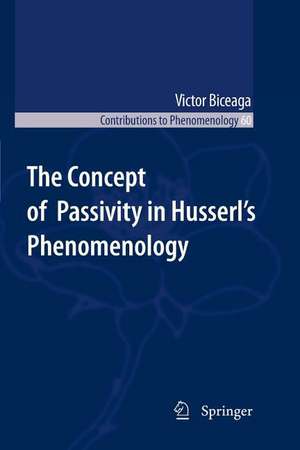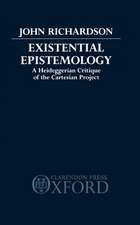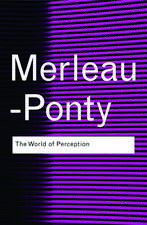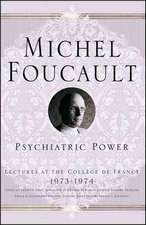The Concept of Passivity in Husserl's Phenomenology: Contributions to Phenomenology, cartea 60
Autor Victor Biceagaen Limba Engleză Paperback – 5 sep 2012
| Toate formatele și edițiile | Preț | Express |
|---|---|---|
| Paperback (1) | 633.68 lei 6-8 săpt. | |
| SPRINGER NETHERLANDS – 5 sep 2012 | 633.68 lei 6-8 săpt. | |
| Hardback (1) | 639.90 lei 6-8 săpt. | |
| SPRINGER NETHERLANDS – 19 iun 2010 | 639.90 lei 6-8 săpt. |
Din seria Contributions to Phenomenology
- 20%
 Preț: 630.93 lei
Preț: 630.93 lei - 20%
 Preț: 693.50 lei
Preț: 693.50 lei - 8%
 Preț: 509.67 lei
Preț: 509.67 lei - 18%
 Preț: 984.42 lei
Preț: 984.42 lei - 18%
 Preț: 1230.03 lei
Preț: 1230.03 lei - 15%
 Preț: 645.79 lei
Preț: 645.79 lei - 15%
 Preț: 657.39 lei
Preț: 657.39 lei - 18%
 Preț: 728.28 lei
Preț: 728.28 lei - 15%
 Preț: 635.96 lei
Preț: 635.96 lei - 15%
 Preț: 578.87 lei
Preț: 578.87 lei - 15%
 Preț: 638.43 lei
Preț: 638.43 lei - 15%
 Preț: 691.59 lei
Preț: 691.59 lei - 20%
 Preț: 505.33 lei
Preț: 505.33 lei - 15%
 Preț: 645.28 lei
Preț: 645.28 lei - 15%
 Preț: 637.28 lei
Preț: 637.28 lei - 18%
 Preț: 951.91 lei
Preț: 951.91 lei - 15%
 Preț: 634.00 lei
Preț: 634.00 lei - 15%
 Preț: 646.75 lei
Preț: 646.75 lei - 18%
 Preț: 727.97 lei
Preț: 727.97 lei - 15%
 Preț: 693.71 lei
Preț: 693.71 lei - 18%
 Preț: 729.06 lei
Preț: 729.06 lei - 15%
 Preț: 692.56 lei
Preț: 692.56 lei - 18%
 Preț: 778.94 lei
Preț: 778.94 lei - 18%
 Preț: 780.68 lei
Preț: 780.68 lei - 15%
 Preț: 646.62 lei
Preț: 646.62 lei - 18%
 Preț: 1231.47 lei
Preț: 1231.47 lei - 18%
 Preț: 730.35 lei
Preț: 730.35 lei - 18%
 Preț: 784.61 lei
Preț: 784.61 lei -
 Preț: 432.71 lei
Preț: 432.71 lei
Preț: 633.68 lei
Preț vechi: 745.50 lei
-15% Nou
Puncte Express: 951
Preț estimativ în valută:
121.26€ • 129.66$ • 101.10£
121.26€ • 129.66$ • 101.10£
Carte tipărită la comandă
Livrare economică 17 aprilie-01 mai
Preluare comenzi: 021 569.72.76
Specificații
ISBN-13: 9789400732483
ISBN-10: 9400732481
Pagini: 160
Ilustrații: XXIII, 220 p.
Dimensiuni: 155 x 235 x 8 mm
Greutate: 0.23 kg
Ediția:2010
Editura: SPRINGER NETHERLANDS
Colecția Springer
Seria Contributions to Phenomenology
Locul publicării:Dordrecht, Netherlands
ISBN-10: 9400732481
Pagini: 160
Ilustrații: XXIII, 220 p.
Dimensiuni: 155 x 235 x 8 mm
Greutate: 0.23 kg
Ediția:2010
Editura: SPRINGER NETHERLANDS
Colecția Springer
Seria Contributions to Phenomenology
Locul publicării:Dordrecht, Netherlands
Public țintă
ResearchCuprins
Introduction. 1. The traditionally subordinate role of passivity. 2. The problematic character of the notion of passive synthesis. 3. Static and genetic phenomenology. 4. Preliminary account of the composition of the passive sphere. 5. Synopsis.- I. Passivity and Self-temporalization. 1. Time-consciousness and association. 2. The three levels of temporality. 3. Double intentionality. 4. Time-consciousness and alterity. 5. Rhythm.- II. Originary Passivity. 1. Association as a topic of phenomenological inquiry. 2. Primordial associations. 3. Similarity and contrast as conditions of possibility for hyletic unities. 4. The lawfulness of associations. 5. Passivity and affection.- III. Secondary Passivity. 1. Memory as image consciousness. 2. Memory as reproductive presentification. 3. Memory and objectivity. 4. Forgetting.- IV. Passivity and Crisis. 1. The concept of habitus. 2. Passivity and language: the problem of translation. 3. Reason versus passivity.- V. Passivity and Alterity. 1. The problem of embodiment: passivity and self-alterity. 2. Passivity and intersubjectivity. 3. Passivity and alien cultures.
Notă biografică
Victor Biceaga is Assistant Professor of Philosophy at Nipissing University, North Bay, Canada
Textul de pe ultima copertă
Building upon Husserl’s challenge to oppositions such as those between form and content and between constituting and constituted, The Concept of Passivity in Husserl’s Phenomenology construes activity and passivity not as reciprocally exclusive terms but as mutually dependent moments of acts of consciousness. The book outlines the contribution of passivity to the constitution of phenomena as diverse as temporal syntheses, perceptual associations, memory fulfillment and cross-cultural communication. The detailed study of the phenomena of affection, forgetting, habitus and translation sets out a distinction between three meanings of passivity: receptivity, sedimentation or inactuality and alienation. Husserl’s texts are interpreted as defending the idea that cultural crises are not brought to a close by replacing passivity with activity but by having more of both.
Caracteristici
The vast and fast growing secondary literature on Husserl in English has tended to overlook the problem of passivity Claims that passivity makes it such that the sphere of ownness is always already alterated or infiltrated by alienness Makes the controversial claim that Husserl’s apparent ethical voluntarism conceals his more nuanced account of ethical life which, instead of conflating passivity with inertia, servitude or impotence, conceives of it as responsitivity to a plurality of values Includes supplementary material: sn.pub/extras


















